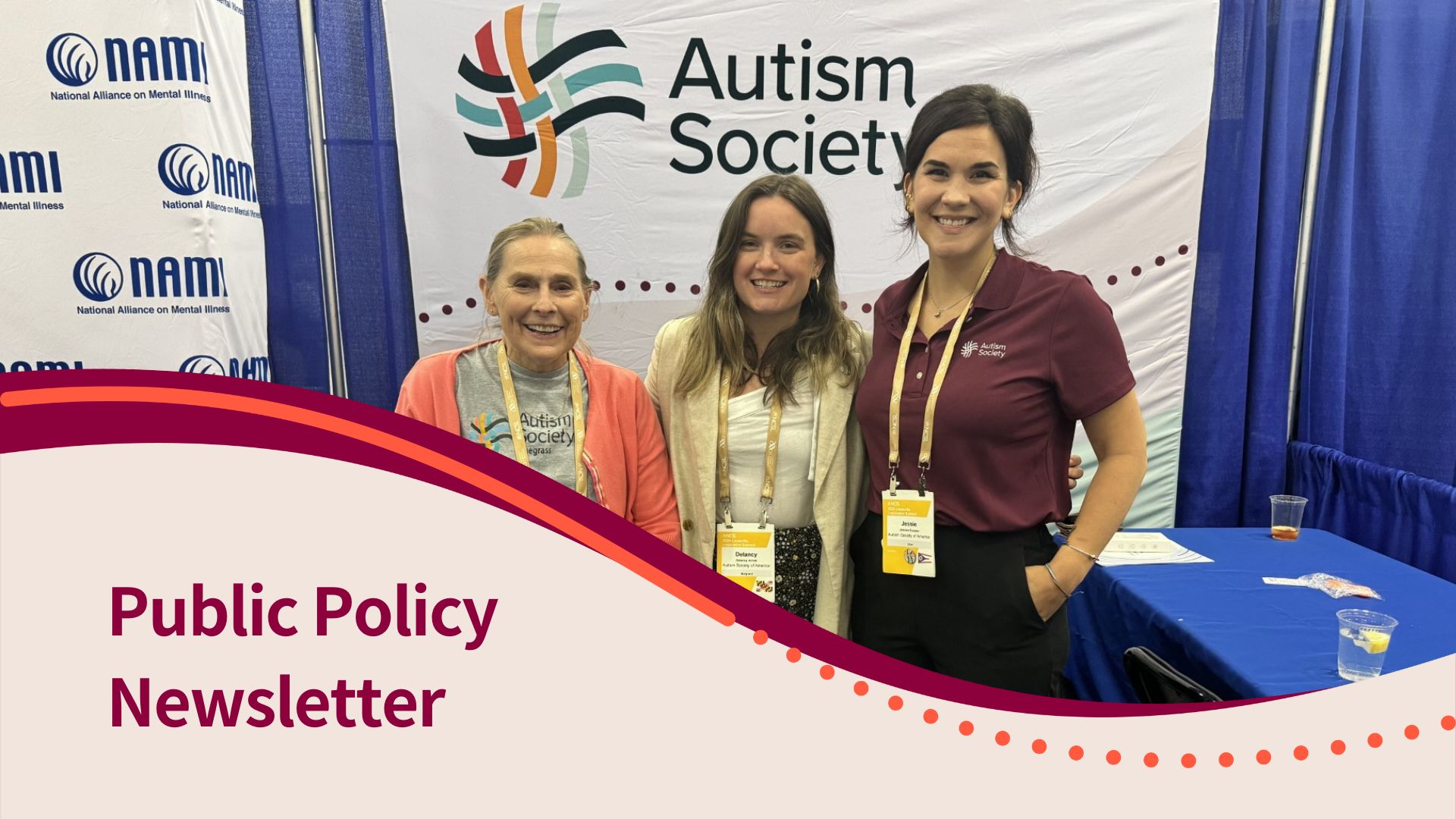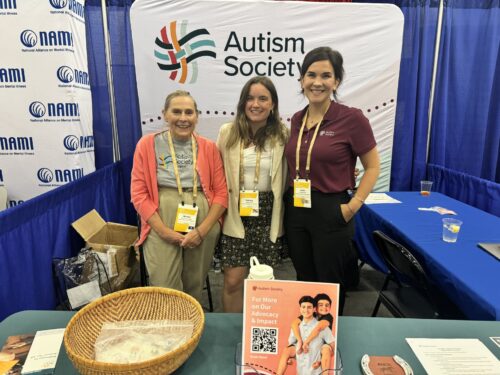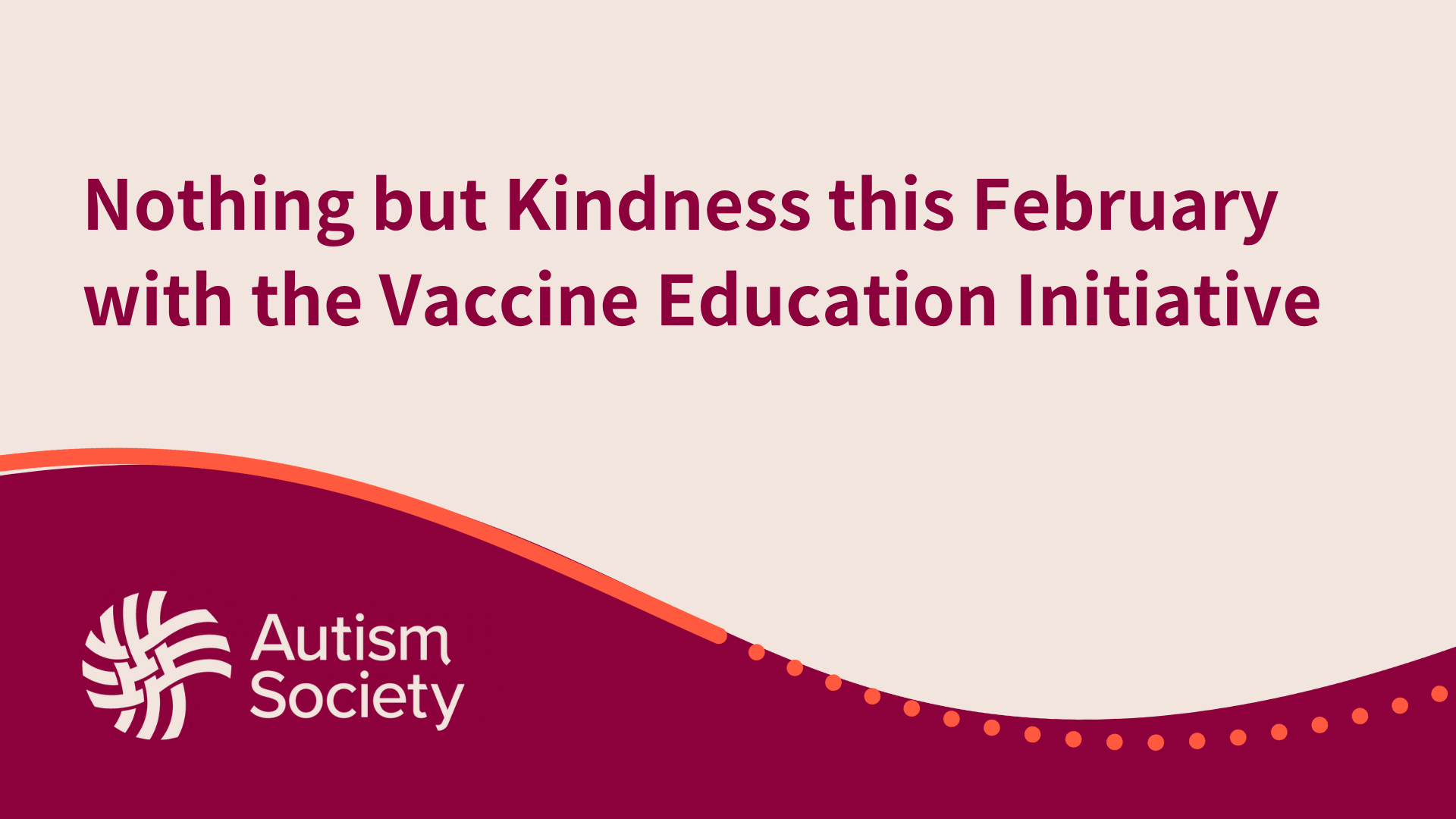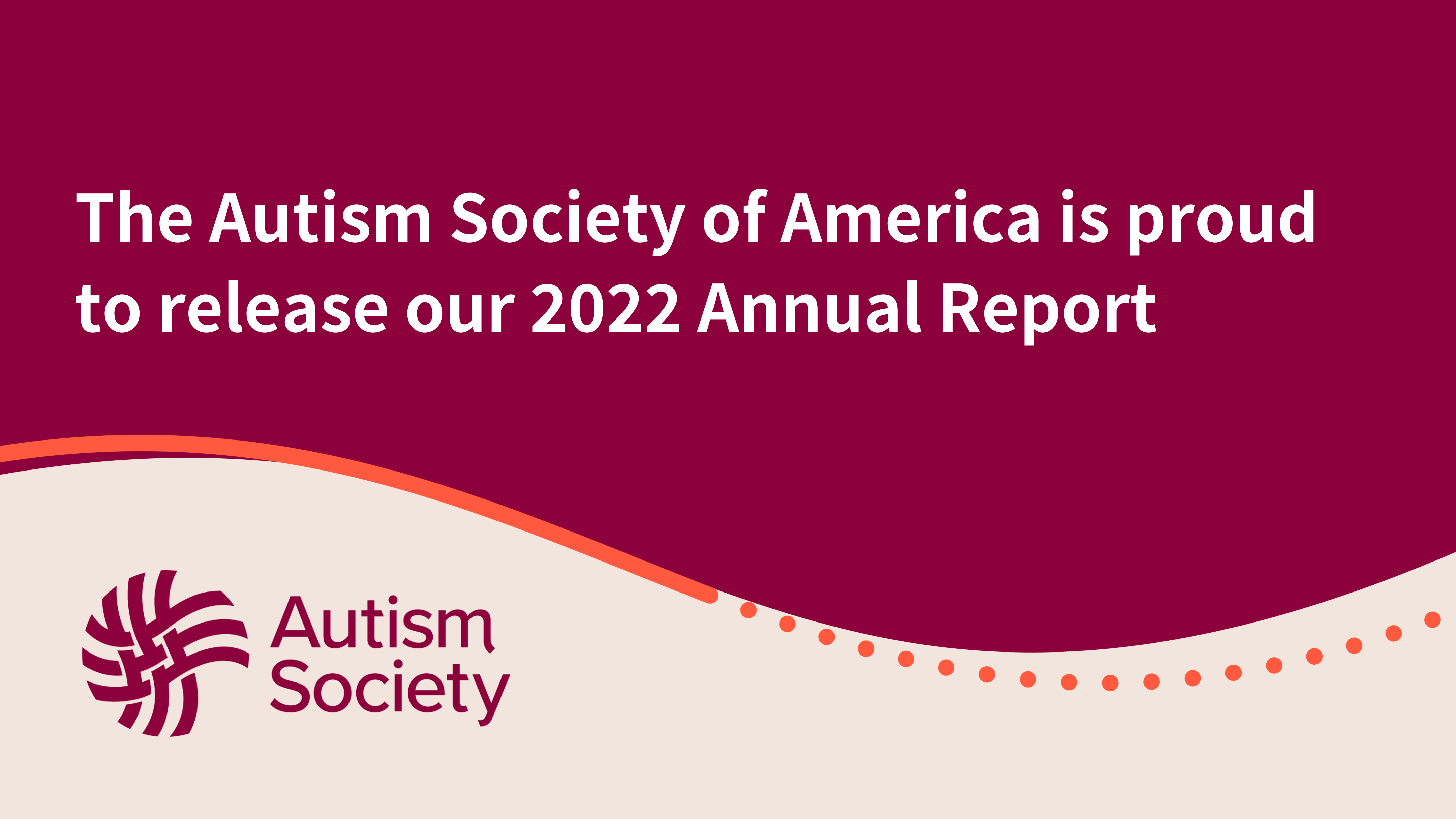
In this issue of Capitol Connection, find a table outlining the difference between House and Senate funding bills and an update on the reauthorization of the Autism CARES Act and other legislation. In addition, access a resource on model state legislation for the upcoming session. Please continue to use the Action Center to write to Members of Congress and our Election Center to prepare for election day on November 5, 2024.
Legislative Updates
FY 2025 Annual Funding
On August 1, the Senate Appropriations Committee advanced the Labor-Health-Human Services-Education (LHHS) bill with a strong bipartisan vote of 25-3 (see press release). The Senate’s version of the bill maintains level funding for most disability programs while also increasing some program funding and restoring cuts made in the House.
One of the most impactful changes is the proposed $300 million increase in special education state grants, which significantly surpasses the $25 million increase proposed by the House. This boost is vital for ensuring that students with disabilities receive the support and resources they need and are entitled to thrive in educational settings. Additionally, the Senate’s proposal includes increased funding for early intervention and technical assistance programs under the Individuals with Disabilities Education Act (IDEA), further strengthening support for young children with disabilities and their families.
The Senate bill also seeks to restore funding for several programs that were cut in the House version. This includes critical programs administered by the Centers for Disease Control and Prevention (CDC), such as those focused on suicide and drowning prevention, as well as vaccines for children. Importantly, the Senate bill provides $3 million for programs under Kevin and Avonte’s Law, which supports initiatives to prevent wandering and enhance the safety of individuals with Autism and other disabilities. This is in stark contrast to the House proposal, which suggested cutting $1 million from this program. Furthermore, the Senate bill allocates an additional $21 million for the continued implementation of the 988 mental health hotline, a critical resource for individuals in crisis. This funding increase will help expand access to mental health support, particularly for those in immediate need.
Overall, the Senate’s LHHS bill represents a strong commitment to supporting individuals with disabilities and preserving essential public health programs. As the legislative process continues, the Autism Society will monitor how these proposals evolve and advocate for the needs of the disability community. See the full table comparing the House and Senate bills below.
| Table Comparing Appropriations for FY 24 to FY 25 for Programs within the L-HHS-ED and DOJ bills (in millions) | ||||||
| President FY 2024 Request | Final FY 2024 | President FY 2025 Request | House FY 2025 Request | Senate FY 2025 Request | House FY 2025
v Senate 2025 |
|
| Labor, Health and Human Services, Education, and Related Agencies | ||||||
| Health Resources and Services Administration (HRSA) | ||||||
| Maternal and Child Health Block Grant | 937.0 | 814.0 | 937.0 | 803.0 | 817.0 | +14.0 |
| Autism and other DD (Includes LEND) | 57.0 | 56.0 | 57.0 | 57.0 | 56.0 | -1.0 |
| Administration for Community Living (ACL) | ||||||
| Protection and Advocacy | 60.0 | 45.0 | 45.0 | 45.0 | 45.0 | 0 |
| DD Councils | 82.0 | 81.0 | 81.0 | 81.0 | 81.0 | 0 |
| University Centers | 46.0 | 43.0 | 43.0 | 43.0 | 43.0 | 0 |
| Projects of National Significance | 16.0 | 12.0 | 15.0 | 12.0 | 12.0 | 0 |
| Lifespan Respite | 14.0 | 10.0 | 10.0 | 10.0 | 11.0 | +1.0 |
| Centers for Disease Control and Prevention (CDC) | ||||||
| Center on Birth Defects and DD (NCBDDD) | 223.0 | 206.0 | 206.0 | 206.0 | 210.0 | +4.0 |
| Injury Prevention and Control | 1,352.0 | 761.0 | 943.0 | 0
|
776.0 | -776.0 |
| —Vaccines for Children | 6,002.0 | 5,815.0 | 8,040.0 | 0 | 7,120.0 | +7,120.0
|
| Drowning Prevention | 2.0 | 2.0 | 2.0 | * | 2.0 | * |
| Suicide Prevention | 49.0 | 30.0 | 68.0 | * | 38.0 | * |
| 988 Behavioral Health Hotline | 836.0 | 520.0 | 602.0 | 519.0
|
540.0 | +21.0 |
| National Institutes of Health | ||||||
| NICHD
|
1,749.0 | 1,759.0 | * | 1,800.0 | * | |
| NIMH | 1,949.0 | 2,188.0 | 2,503.0 | 2,642.0 | +139.0 | |
| Department of Education | ||||||
| IDEA Part B | 16,259.0 | 14,214.0 | 14,394.0 | 14,239.0 | 14,509.0 | +270.0 |
| Part C Early Intervention | 932.0 | 540.0 | 545.0 | 540.0 | 545.0 | +5.0 |
| Preschool Grants | 502.5 | 420.0 | 425.0 | 420.0 | 420.0 | 0 |
| State Personnel Development | 53.6 | 38.6 | 38.6 | 39.0
|
39.0
|
0 |
| Technical Assistance | 55.5 | 39.0 | 45.0 | 39.0
|
76.0 | +37.0 |
| Personnel Preparation | 250.0 | 115.0 | 125.0 | 115.0
|
115.0 | 0 |
| Parent Information Centers | 49.0 | 33.0 | 33.0 | 33.0
|
33.0 | 0 |
| Education technology | 41.5 | 31.4 | 31.4 | 31.4 | 31.4 | 0 |
| Postsecondary Program for ID | 15.0 | 13.8 | 13.8 | 13.8 | 13.8 | 0 |
| Supported Employment | 22.5 | 22.5 | 22.5 | 22.5
|
22.5 | 0 |
| Department of Justice | ||||||
| Kevin and Avonte’s Law | 3.0 | 3.0 | 3.0 | 2.0 | 3.0 | +1.0 |
Autism CARES Act
On July 31, The Senate HELP Committee approved a bipartisan bill to reauthorize the Autism CARES Act (S. 4762) on a vote of 20-1 with Senator Rand Paul (R-KY) casting the only dissenting vote. S. 4762 was introduced by Senators Ben Ray Luján (D-NM) and Susan Collins (R-ME) The Senate bill is slightly different from the House Committee-passed bill (H.R. 7213) leading the bills to have to be conferenced after they are passed by the full House and Senate (see Autism Society letter to Senate). Both bills include many of the priorities advocated by the Autism Society, including an additional focus on research to help improve the lives of those with complex medical and behavioral support needs and those with communication needs. The Senate bill includes a new provision allowing the Secretary of Health and Human Services to provide technical assistance to states regarding communication, in addition to authorizing more research on this important support. Both bills are expected to be taken up in September following the August recess. Please use the Autism Society Action Alert to continue to educate members of Congress about the need to reauthorize this law before the September 30 sunset.
New Bills on ABLE Accounts
Senator Bob Casey (D-PA) introduced three bills in a package to expand access to ABLE Accounts. ABLE Accounts allow individuals with disabilities to save additional money that does not impact their eligibility for federal assistance programs such as SSI. The first bill, the ABLE Awareness Act, would require federal and state agencies to notify individuals about ABLE Accounts. The second bill, the ABLE Employment Flexibility Act, would allow employers to contribute to employees’ ABLE Accounts as they can to 401k accounts. The last bill, the ABLE Direct Deposit Act, would affirm that direct deposits from employers or government programs can be made to ABLE accounts. Learn more about these bills in Senator Casey’s press release.
New GAO Report on K-12 Schooling for Students with Disabilities
A new Government Accounting Office (GAO) report has found that in the 2021–22 school year, only 20 percent of public-school students with disabilities (which total more than 7.3 million nationwide) were in schools with a social worker, school psychologist, school nurse, and counselor. The GAO also found significant state-to-state variation in student-to-staff ratios for students with disabilities, ranging from 9 to 1 to 30 to 1, with there even being variety within a district. The report highlights that most data, such as the number of special education staff, is not available at the school level. These gaps impede the Department of Education’s (ED) ability to evaluate and address resource distribution as intended by the Individuals with Disabilities Education Act, and importantly, ED lacks the authority to collect school-level/district data. The GAO recommends that Congress grant ED the authority to collect such data to better understand and address inequities in special education services.
ADA Celebrations
At the White House
The Autism Society was honored to attend the Disability Pride Month Convening aligned with celebrations of the Americans with Disabilities Act (ADA) hosted by the Biden Administration on July 30. Speakers included Kelly Buckland, Disability Policy Advisor at the U.S. Department of Transportation, Karla Gilbride, General Counsel at the Equal Employment Opportunity Commission, and Eric Harris, Associate Executive Director of External Affairs at Disability Rights California, among others. A recording of the event is now up on White House YouTube.
Department of Justice Blog
The Civil Rights Division at the U.S. Department of Justice shared a blog celebrating their commitment to technological equity on the anniversary of the ADA. The Department of Justice (DOJ) has finalized a rule establishing a technical standard for the accessibility of apps and websites, as well as reached multiple settlements in Texas, Oklahoma, and Illinois regarding the inaccessibility of websites, apps, and medical check-ins. The DOJ also recently finalized a rule under Title II of the ADA to improve access to medical diagnostic equipment for the disability community. The new rule adopts a technical standard for accessible equipment such as examination tables and weight scales being compatible for wheelchair users. See more in the press release.
State Advocacy
NCSL

Autism Society Booth at NCSL with Melanie Tyner-Wilson, Autism Society of the Bluegrass, Delancy Allred and Jessica Sussen, Autism Society of America
The Autism Society of America was excited to host a booth at the National Conference of State Legislatures annual summit the week of August 5 in Louisville Kentucky with our local affiliate. Over 600 state legislators, staff, and government affairs staff stopped by the booth to learn more about Autism and our work. The Autism Society team highlighted state advocacy goals for the upcoming session and other resources.
Share:





